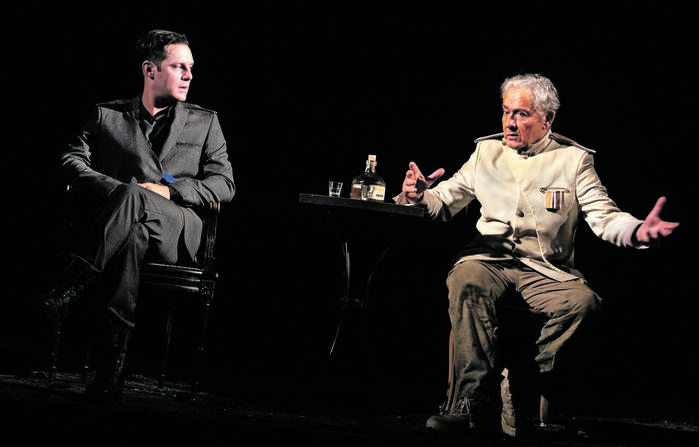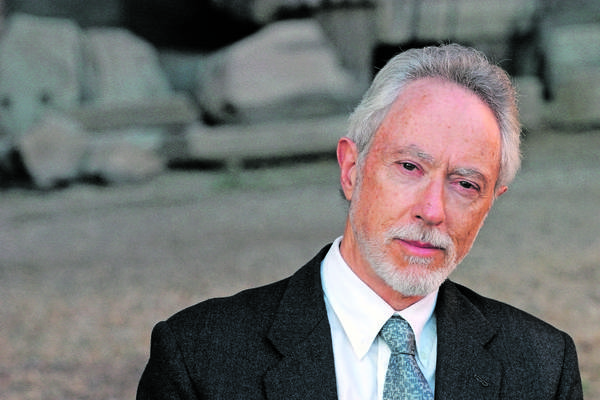Time and tide: Scenes from a stage adaptation of the novel Waiting for the Barbarians by Nobel Prize-winning South African novelist JM Coetzee. (Photo by Raphael GAILLARDE/Gamma-Rapho via Getty Images)
Time waits for no word, endowing it with meanings unimagined when first it was uttered.
Take the Greek word “barbaros” — literally, “stammering” — an encapsulation of how other languages sounded to the Greek ear.
“It’s all ‘bar-bar’ to me,” one can imagine Ancient Greeks joking to each other in some Athenian taverna thousands of years ago.
From a semi-linguistic marker, “barbaros” evolved to describe a “barbarian” — someone not Greek — then later a person neither Greek nor Roman, in short, a foreigner.
But a foreigner was not to be confused with a stranger, or the strange, “xenos” in Greek, from which come “xenophobe” and “xenophobia”.
It is in the sense of barbarians as non-Romans that the poet Constantine P Cavafy wrote one of his best-known and most celebrated poems Waiting for the Barbarians.
First published in a private pamphlet in 1904, it begins by asking “What are we waiting for, assembled in the forum?”
The answer is immediate: “The barbarians are due here today.”
Senators, the emperor, the two consuls, praetors, orators wait all day for the barbarians to arrive. Then night falls and the streets and squares of this poetic Rome empty out, the populace heading home “lost in thought”.
“And some of our men just in from the border say/ there are no barbarians any longer.”
Cavafy now delivers his brilliant insight into the “problem” of the foreigner: “Now what’s going to happen to us without barbarians?/ Those people were a kind of solution.”
Today’s politics in South Africa show the “foreign national” as scapegoat, the “answer” to multiple shortcomings and failings entirely of South Africans’ own making.
But it is of course easier to blame the foreigner than to admit one’s own responsibility and culpability.
Expect much more of this toxic hate-stirring as venal and greedy politicians try to swindle people into voting for them in the 2024 elections.
Showing confidence in the cultural bearings of readers, JM Coetzee published Waiting for the Barbarians, a novel, in 1980. It made no reference to Cavafy’s poem but, in any case, its chronicle of an end of empire gives resonance and particularity to the title.
Coetzee teases out some of the questions Cavafy’s poem raises, replacing speculation with grim elaboration. To the wry idea that the barbarians are a solution of sorts Coetzee provides terrifying realism.
 Time and tide: Scenes from a stage adaptation of the novel Waiting for the Barbarians by Nobel Prize-winning South African novelist JM Coetzee. (Photo by Raphael GAILLARDE/Gamma-Rapho via Getty Images)
Time and tide: Scenes from a stage adaptation of the novel Waiting for the Barbarians by Nobel Prize-winning South African novelist JM Coetzee. (Photo by Raphael GAILLARDE/Gamma-Rapho via Getty Images)
“I think: ‘I wanted to live outside history. I wanted to live outside the history that Empire imposes on its subjects, even its lost subjects.
“I never wished it for the barbarians that they should have the history of Empire laid upon them. How can I believe that that is cause for shame?’”
Such are the thoughts of the Magistrate, unnamed, who narrates the novel.
In his posting, a small frontier settlement, he has for years collected taxes and tithes, administered communal lands, supervised the small garrison and its officers, watched over local trade and been the law of the land twice a week.
It is a quiet life in the service and on the margins of the Empire. Retirement beckons and, “For the rest I watch the sun rise and set, eat and sleep and am content.”
Into this backwater, where the hand of Empire has only ever been indirectly evident, comes Colonel Joll of the Third Bureau of the Civil Guard. Fears in the capital that “barbarian tribes” in the north and west are uniting prompt the presence of the “unsleeping guardians of the Empire”.
Belying their anodyne name, Third Bureau, these officials are instead akin to the Spanish Inquisition, sensing sedition here, rebellion there and having the keenest noses for truth.
What constitutes truth for them is very different from the truth — it is what they want to hear confessed to fit into the larger story of restiveness on the frontier and imminent attacks on the Empire from a newly allied and emboldened enemy.
These bureaucrats are “devotees of truth, doctors of interrogation”, writes the Magistrate. In plainer words, they are torturers who embody the tyranny of the Empire.
Dutifully, the Magistrate co-operates with Joll, while trying to point out that the two men he intends questioning cannot have been part of a raiding party. One is old, a “greybeard”, the other his young nephew.
Succumbing to his innate dislike of Joll and to the injustice of the men’s situation, the Magistrate begins to advocate their innocence.
Questioning the older man, he discovers the two were on their way to the settlement to see a doctor about the youth’s injured forearm, bloody proof of which becomes apparent.
But Joll — a creature of seeming horror with discs of darkened glass, suspended from wire loops, shielding his eyes — will have none of the Magistrate’s rationality. Joll’s world is not evidence-based. Instead, “There is a certain tone,” Joll says. “A certain tone enters the voice of a man who is telling the truth.”
And so Joll’s “investigations” continue until the older man, alleged to be enraged, attacks Joll and in the ensuing struggle falls against the wall. Or so the official version goes. Undeniable is that the man does not regain consciousness.
The Magistrate is stirred out of his long-lived complacency by this miscarriage of procedures and cover-up. Here, in a single stark incident, a prisoner wrongly arrested and then tortured to death is an allegory of the oppressor and the oppressed, the Empire and the people.
Through it, the Magistrate sees that he himself has been acting on the oppressor’s behalf for all of his time on the frontier. As the Empire’s man, he is the Empire in this far-flung outpost.
So searing is this epiphany that soon he takes in, feeds and cares for a young woman who has suffered under Joll’s torture.
Again not named, the woman was brought in with a band of her fellow fisherfolk seized on a raid by the Third Bureau in search of people to interrogate. They are all mere fodder for the battle yarn that Joll is spinning of barbarians plotting against the Empire.
It is not truth that matters but the conformity of information and confessions to the official narrative — under attack, the Empire must defend itself.
 Nobel Prize-winning South African novelist JM Coetzee. (Photo by TIZIANA FABI / AFP)
Nobel Prize-winning South African novelist JM Coetzee. (Photo by TIZIANA FABI / AFP)
The Magistrate, given to serial exploitative relations with women, embarks on yet another with this young woman, whose feet have been broken and injured during interrogation. And yet, there is a difference — the realisation of his own role as male oppressor and of his complicity with the pitiless authoritarianism of the Empire.
To atone personally and professionally, the Magistrate decides on an act of restoration, a deed from which there will be no turning back for him. As Joll says when things have played out: “You seem to want to make a name for yourself as the One Just Man, the man who is prepared to sacrifice his freedom to his principles.”
What unfolds for first-time readers of the novel is discovery; for re-readers of this classic, yet more to contemplate what was missed at first and subsequent readings.
Throughout there is the great pleasure of the precise, pellucid prose that is Coetzee’s hallmark.
Cavafy composing his poem in the great Egyptian seaside city of Alexandria in November 1898 and Coetzee writing his novel in the years after the 1976 Soweto uprising: both points of inflection and harbingers of change. For Cavafy, a new millennium approaching and with it the coming fall and rise of empires. For Coetzee, an allegory of the inevitable demise of oppression by another name: apartheid.
History, Israel and Gaza are here too, in the Magistrate’s reflections: “Empire has created the time of history. Empire has located its existence not in the smooth recurrent spinning time of the cycle of the seasons but in the jagged time of rise and fall, of beginning and end, of catastrophe.
“Empire dooms itself to live in history and play against history. One thought alone preoccupies the submerged mind of Empire: how not to end, how not to die, how to prolong its era.
“By day it pursues its enemies. It is cunning and ruthless, it sends its bloodhounds everywhere. By night it feeds on images of disaster: the sack of cities, the rape of populations, pyramids of bones, acres of desolation.”